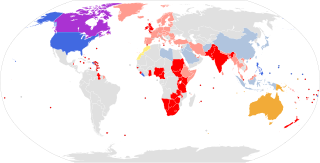Oxford dictionary may refer to any dictionary published by Oxford University Press, particularly:
The identity of the longest word in English depends on the definition of a word and of length.

The Oxford English Dictionary (OED) is the principal historical dictionary of the English language, published by Oxford University Press (OUP). It traces the historical development of the English language, providing a comprehensive resource to scholars and academic researchers, as well as describing usage in its many variations throughout the world.

Huzzah is, according to the Oxford English Dictionary (OED), "apparently a mere exclamation". The dictionary does not mention any specific derivation. Whatever its origins, it has seen occasional literary use since at least the time of Shakespeare, as the first use was in 1573, according to Merriam-Webster.

Sir James Augustus Henry Murray, FBA was a British lexicographer and philologist. He was the primary editor of the Oxford English Dictionary (OED) from 1879 until his death.

A body of water or waterbody is any significant accumulation of water on the surface of Earth or another planet. The term most often refers to oceans, seas, and lakes, but it includes smaller pools of water such as ponds, wetlands, or more rarely, puddles. A body of water does not have to be still or contained; rivers, streams, canals, and other geographical features where water moves from one place to another are also considered bodies of water.

The Shorter Oxford English Dictionary (SOED) is an English language dictionary published by the Oxford University Press. The SOED is a two-volume abridgement of the twenty-volume Oxford English Dictionary (OED).
Compact Oxford English Dictionary may refer to:

Despite the various English dialects spoken from country to country and within different regions of the same country, there are only slight regional variations in English orthography, the two most notable variations being British and American spelling. Many of the differences between American and British/English in the Commonwealth of Nations date back to a time before spelling standards were developed. For instance, some spellings seen as "American" today were once commonly used in Britain, and some spellings seen as "British" were once commonly used in the United States.
Edmund S. C. Weiner is the former co-editor of the Second Edition of the Oxford English Dictionary (1985–1989) and Deputy Chief Editor of the Oxford English Dictionary (1993–present). He originally joined the OED staff in 1977, becoming the dictionary's chief philologist.
Oxford spelling is a spelling standard, named after its use by the Oxford University Press, that prescribes the use of British spelling in combination with the suffix -ize in words like realize and organization instead of -ise endings.

Oenophilia, in the strictest sense, describes a disciplined devotion to wine, accompanying strict traditions of consumption and appreciation. In a general sense however, oenophilia simply refers to the enjoyment of wine, often by laymen. Oenophiles are also known as wine aficionados or connoisseurs. They are people who appreciate or collect wine, particularly grape wines from certain regions, varietal types, or methods of manufacture. While most oenophiles are hobbyists, some may also be professionals like vintners, sommeliers, wine merchants, or one who tastes and grades wines for a living.

Lexico was a dictionary website that provided a collection of English and Spanish dictionaries produced by Oxford University Press (OUP), the publishing house of the University of Oxford. While the dictionary content on Lexico came from OUP, this website was operated by Dictionary.com, whose eponymous website hosts dictionaries by other publishers such as Random House. The website was closed and redirected to Dictionary.com on 26 August 2022.

Spindrift is the spray blown from cresting waves during a gale. This spray, which "drifts" in the direction of the gale, is one of the characteristics of a wind speed of 8 Beaufort and higher at sea. In Greek and Roman mythology, Leucothea was the goddess of spindrift.
Peter Gilliver is a lexicographer and associate editor of the Oxford English Dictionary.
Twat is an English-language vulgarism which means the vulva or vagina, and is used figuratively as a derogatory epithet. In British English, and Irish English it is a common insult referring to an obnoxious or stupid person regardless of gender; in American English, it is rarer and usually used to insult a woman. In Britain and Ireland, the usual pronunciation rhymes with "hat", while Americans most often use the older pronunciation that rhymes with "squat". This is reflected in the former variant spelling of "twot".
Meanderings of Memory is a rare book published in London in 1852 and attributed to Nightlark. Although it is cited as a first or early source for over 50 entries in the Oxford English Dictionary (OED), the current OED editors have been unable to locate a surviving copy. OED editors made their search for the elusive source public in May 2013.
The OED is the Oxford English Dictionary, the principal historical dictionary of the English language.

The Ring of Words: Tolkien and the Oxford English Dictionary is a 2006 book by three editors of the Oxford English Dictionary, Peter Gilliver, Jeremy Marshall and Edmund Weiner. It examines J. R. R. Tolkien's brief period working as a lexicographer with the OED after World War I, traces his use of philology as it is apparent in his writings, and in particular in his legendarium, and finally examines in detail over 100 words that he used, developed or invented.